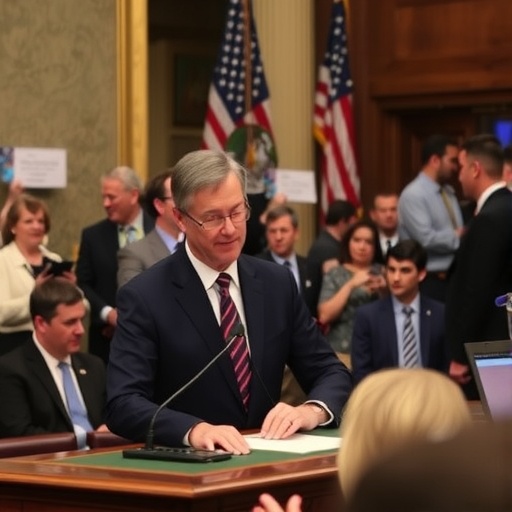Virginia General Assembly Convenes Urgent Special Session as Political Tensions Boil Over Protests and Policy Clashes
In a dramatic move that has gripped the Commonwealth, the Virginia General Assembly kicked off a special session on Monday, thrusting lawmakers into the heart of escalating political tensions fueled by widespread protests and fierce debates over key legislation. With demonstrators clashing outside the state capitol in Richmond, the session—called by Governor Glenn Youngkin—aims to tackle pressing issues from education reforms to voting rights, but not without sparking accusations of partisan maneuvering.
- Protests Intensify Outside Richmond Capitol as Lawmakers Convene
- Governor Youngkin’s Surprise Call Ignites Bipartisan Backlash
- Key Legislation Takes Center Stage: Education, Elections, and Beyond
- Partisan Clashes Erupt in Chambers, Testing Virginia’s Political Resilience
- Looking Ahead: Potential Outcomes and Lasting Impact on Virginia’s Future
Protests Intensify Outside Richmond Capitol as Lawmakers Convene
The air in Richmond was thick with chants and the hum of police sirens as the special session began, marking a pivotal moment in Virginia‘s turbulent political landscape. Over 500 protesters gathered on the Capitol grounds, waving signs that read “Protect Our Schools” and “No More Partisan Games,” in response to ongoing disputes over school curriculum standards and election integrity laws. This isn’t just another legislative gathering; it’s a high-stakes showdown amid a surge in public unrest that has seen attendance at rallies triple since last month’s contentious town halls.
According to data from the Virginia State Police, protest-related incidents have risen by 40% in the past quarter, with hotspots in urban centers like Richmond, Norfolk, and Alexandria. Organizers from groups such as the Virginia Education Association and the ACLU of Virginia credit the special session for mobilizing crowds, arguing that it’s a direct response to what they call “suppressed voices in the legislative process.” One protester, a high school teacher from Fairfax County named Maria Gonzalez, shared her frustration: “We’ve been ignored for too long. This session is our chance to demand real change, not just more empty promises.”
The scene outside contrasted sharply with the polished proceedings inside, where delegates and senators filed in under heightened security. Historical parallels are hard to ignore; the last special session in 2022 addressed budget shortfalls post-pandemic, but this one feels more charged, echoing the divisions of the 2020 election cycle when Virginia flipped blue in key races. Political analysts point to a perfect storm: lingering effects of the COVID-19 recovery, inflation pressures on households, and a polarized electorate ahead of the 2024 midterms.
Inside the chambers, the atmosphere was no less tense. House Speaker Eileen Filler-Corn, a Democrat, opened the session with a call for unity, stating, “Virginia’s future hangs in the balance. We must rise above partisanship to deliver legislation that serves all residents.” Yet, whispers of filibusters and procedural delays already suggest the road ahead will be rocky.
Governor Youngkin’s Surprise Call Ignites Bipartisan Backlash
Governor Glenn Youngkin’s decision to summon the General Assembly into special session caught many off guard, announced just days after a wave of protests swept through the state following vetoes on several progressive bills. The Republican governor framed the move as essential for “addressing the people’s priorities,” citing surveys showing 62% of Virginians favor immediate action on economic relief and public safety measures. But critics, including Senate Minority Leader Dick Saslaw, decried it as a “political stunt” designed to rally the GOP base.
Youngkin’s proclamation highlighted three core areas: reforming state education funding to emphasize parental rights, bolstering election security protocols, and allocating emergency funds for infrastructure strained by recent floods. In a press conference prior to the session, the governor emphasized, “This isn’t about party lines; it’s about protecting Virginia families from the chaos we’ve seen in our streets and schools.” His words resonated with conservative lawmakers, who have pushed for legislation limiting discussions on race and gender in classrooms—a hot-button issue that sparked the initial protests.
Democrats, holding a slim majority in the House, responded swiftly with their own agenda. They introduced bills to expand voting access, including automatic voter registration and extended early voting periods, measures blocked in the regular session. “The governor’s call is welcome, but only if it leads to inclusive politics, not division,” said Delegate Lamont Bagby, a key figure in the Black Caucus. Tensions peaked when Republicans attempted to fast-track a bill on school choice vouchers, drawing immediate objections and threats of walkouts.
Behind the scenes, lobbying efforts have intensified. The Virginia Chamber of Commerce has poured resources into supporting business-friendly legislation, while environmental groups like the Sierra Club Virginia Chapter rally against any rollbacks in clean energy mandates. A recent poll by Roanoke College Institute of Public Affairs revealed that 55% of voters view the special session as necessary, yet 48% worry it could exacerbate political divides—highlighting the delicate balance lawmakers must strike.
Key Legislation Takes Center Stage: Education, Elections, and Beyond
At the core of this special session lies a slate of legislation poised to reshape Virginia’s social and economic fabric. Topping the agenda is House Bill 187, which seeks to overhaul education policy by mandating transparency in curriculum development and expanding charter school options. Proponents argue it empowers parents amid declining test scores—Virginia’s SOL scores dropped 5% in math last year, per state education reports—but opponents fear it undermines public schools serving low-income communities.
Election reforms are another flashpoint. Senate Bill 412 proposes stricter ID requirements for absentee ballots, a measure backed by Republicans citing 2020 irregularities, though fact-checkers from the Brennan Center for Justice dispute widespread fraud claims. Democrats counter with their own package, including HB 203, which would eliminate polling place photo ID mandates to boost turnout among minorities and young voters. Statistics show Virginia’s voter participation hovered at 68% in 2022, below the national average, fueling arguments on both sides.
Beyond these, the session addresses budget allocations. With Virginia facing a projected $2.5 billion surplus, lawmakers debate diverting funds to mental health services—a priority after a 15% rise in youth suicides reported by the Virginia Department of Health—or to tax cuts for small businesses reeling from inflation. “This surplus is a lifeline, but how we spend it defines our values,” noted budget expert Dr. Elena Ramirez from the University of Virginia’s Weldon Cooper Center.
Other bills in play include measures on gun control, prompted by recent mass shootings in nearby states, and environmental protections amid Chesapeake Bay pollution concerns. The General Assembly’s committees have already logged over 20 hours of hearings, with public testimony revealing stark divides: rural delegates push for agricultural exemptions, while urban voices demand aggressive climate action.
To illustrate the stakes, consider the case of Loudoun County, where parent-led protests last year led to school board recalls. Similar dynamics are at play here, with social media amplifying voices and turning local issues into statewide battles. Hashtags like #VAGASession and #FixVirginiaNow have trended nationally, drawing attention from outlets like CNN and The Washington Post.
Partisan Clashes Erupt in Chambers, Testing Virginia’s Political Resilience
As the special session unfolded into its second day, partisan clashes spilled into open view, testing the resilience of Virginia’s political institutions. A heated floor debate over education funding saw Republican Senator Frank Ruff accuse Democrats of “grandstanding for votes,” prompting a rare censure motion that failed by a narrow 52-48 vote. Such rhetoric underscores the razor-thin margins in the evenly split Senate, where every vote could tip the scales.
Historical context adds depth to these tensions. Virginia’s General Assembly, one of the oldest in the nation dating back to 1619, has weathered civil rights movements and redistricting battles, but the current polarization rivals the post-2016 era. A study by the Virginia Public Access Project tracks campaign spending at over $150 million in recent cycles, with special interests flooding the session with ads—$5 million alone on education issues.
Women and minority lawmakers have been particularly vocal. Delegate Kathy Tran, the first Asian American woman in the House, introduced a bill expanding paid family leave, tying it to broader equity goals. “In a state as diverse as Virginia, legislation must reflect all of us, not just the loudest,” she asserted during testimony. Meanwhile, Indigenous representatives from tribes like the Pamunkey pushed for land rights recognitions, a long-overdue acknowledgment amid the session’s chaos.
Public engagement has surged, with virtual town halls drawing 10,000 participants daily. Yet, challenges persist: cybersecurity threats targeted the Assembly’s website, delaying bill filings, and internal emails leaked to media revealed strategy sessions bordering on aggressive tactics. Political scientist Dr. James Madison from Virginia Commonwealth University observed, “This session could either bridge divides or deepen them, depending on whether compromise prevails over confrontation.”
Stakeholders beyond politics are watching closely. Business leaders from the Northern Virginia Technology Council warn that unresolved infrastructure bills could stall growth in the tech corridor, home to giants like Amazon’s HQ2. Labor unions, meanwhile, advocate for minimum wage hikes to $15, citing data showing 12% of Virginians below the poverty line.
Looking Ahead: Potential Outcomes and Lasting Impact on Virginia’s Future
As the special session stretches into its third day, eyes are on potential breakthroughs—or breakdowns—that could redefine Virginia’s trajectory. If successful, lawmakers might pass a compromise education bill blending parental input with teacher protections, alongside election tweaks that satisfy both security hawks and access advocates. Governor Youngkin has hinted at signing ceremonies by week’s end, but delays could push votes into next month, risking public fatigue.
Forward-looking implications are profound. A productive session could stabilize politics ahead of 2025 gubernatorial races, boosting Virginia’s reputation as a moderate Southern powerhouse. Conversely, gridlock might fuel more protests, eroding trust in institutions—already at 45% per recent Gallup polls. Economically, passed legislation on budgets could inject $1 billion into recovery efforts, from flood-damaged Southwest Virginia to urban revitalization in Richmond.
Experts predict ripple effects nationally. As a swing state, Virginia’s moves on voting and education could influence federal debates, especially with Congress eyeing similar reforms. Community leaders urge sustained civic involvement: “This is just the beginning,” said activist Jamal Watkins from the Virginia NAACP. “Virginians must hold lawmakers accountable long after the gavel falls.”
In the end, this special session isn’t merely about bills—it’s a referendum on unity in divided times. With the Commonwealth’s diverse 8.6 million residents counting on progress, the coming days will determine if Virginia emerges stronger or more fractured.








